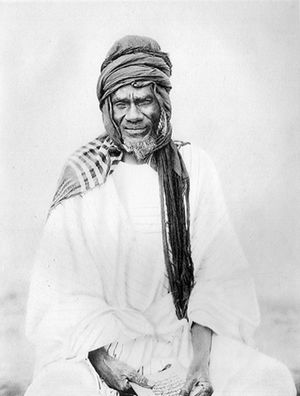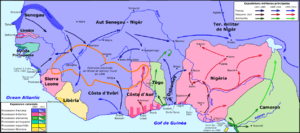Samori Ture facts for kids
Quick facts for kids Samory Toure |
|
|---|---|
 |
|
| Emperor of the Wassoulou Empire | |
| Reign | 1878–1898 |
| Predecessor | position established |
| Successor | position abolished |
| Born | c. 1830 Manyambaladugu |
| Died | June 2, 1900 (aged 69/70) Gabon |
| House | Dyula |
| Religion | Sunni Islam |
Samori Ture (born around 1830 – died June 2, 1900) was a powerful leader in West Africa. He was a Muslim religious leader and a brilliant military planner. Samori Ture founded and led the Wassoulou Empire. This empire covered parts of modern-day Guinea, Sierra Leone, Mali, Côte d'Ivoire, and Burkina Faso.
Samori Ture is famous for strongly resisting French colonial rule in West Africa. He fought against them from 1882 until he was captured in 1898. He was also the great-grandfather of Ahmed Sékou Touré, who became the first president of Guinea.
Contents
Early Life and Becoming a Leader
Samori Ture was born around 1830 in a place called Manyambaladugu, which is in the Kankan region of Guinea. His family were Dyula traders. When he was young, West Africa was changing a lot because of trade with Europeans. This trade brought new goods, including firearms, which changed how wars were fought and made them more deadly. Samori Ture became a Muslim early in his life.
In 1848, Samori's mother was captured during a war. Because he loved her very much, he offered to take her place. After helping his mother gain freedom, Samori worked for the Cissé clan, who had captured her. There, he learned how to use firearms. After some time, he escaped with his mother.
Later, he joined the Bérété army, who were enemies of the Cissé. After two years, he returned to his own people, the Kamara. In 1861, he was made Kélétigui, which means war commander. Samori promised to protect his people from both the Bérété and the Cissé. He built a strong, professional army and put his close family and friends in charge of different groups.
Building the Wassoulou Empire
In 1864, a powerful leader named El Hadj Umar Tall died. He had created a large empire called the Toucouleur Empire. After his death, his empire became weaker, and many local leaders tried to create their own states.
By 1867, Samori Ture was a skilled war commander with his own army. His main goals were to create a strong, loyal army with modern weapons and to build a stable state.
By 1876, Samori was buying modern rifles from the British colony of Freetown in Sierra Leone. He took control of the Buré gold-mining area to get more money for his growing empire. By 1878, he was powerful enough to declare himself faama, or military leader, of his new Wassoulou Empire. He made Bissandugu his capital city.
In 1881, after many battles, Samori took control of Kankan, an important trading center. Kankan was a key place for trading kola nuts and was well-located to control trade routes in all directions. By 1881, the Wassoulou Empire stretched across what is now Guinea and Mali, reaching from Sierra Leone to northern Côte d'Ivoire.
Samori conquered many smaller states around him. He also made sure his empire had good relationships with other powers. He started regular talks with the British in Sierra Leone and built a good relationship with the Fulbe (Fula) people of Futa Jallon.
First Fights with the French
The French started expanding their control in West Africa in the late 1870s. They were moving eastward from Senegal and also trying to connect their bases in Côte d'Ivoire. These actions led them directly into conflict with Samori Ture.
In February 1882, a French army attacked one of Samori's armies. Samori's forces pushed the French back, but he was impressed by how disciplined and well-armed the French troops were.
Samori tried different ways to deal with the French. First, he expanded his empire southwest to create a way to communicate with Liberia. In 1885, he sent a message to the British in Freetown, offering to put his kingdom under British protection. The British didn't want to fight the French at that time, but they did allow Samori to buy many modern repeating rifles.
When a French army tried to take the Buré gold fields in 1885, Samori fought back. He split his army into three fast-moving groups. They moved around the French supply lines, forcing the French to retreat quickly.
War and Final Defeat
Samori's army was very well-equipped with modern firearms and had a clear structure. His army had an infantry (foot soldiers) and a cavalry (soldiers on horseback). By 1887, Samori had between 30,000 and 35,000 infantry and about 3,000 cavalry. However, the French did not give him time to make his position stronger.
In March 1891, a French force attacked Kankan. Samori knew his forts could not stop French artillery, so he started a war of movement. Even though he won some battles against smaller French groups, he couldn't push the French out of the heart of his empire. In June 1892, the French captured Samori's capital, Bissandugu. Also, the British stopped selling him modern weapons because of an agreement called the Brussels Convention of 1890.
Samori moved his base eastward, towards the Bandama and Comoe Rivers. He used a "scorched earth" tactic, destroying everything in an area before he left it. This made it harder for the French to follow him. This move also cut Samori off from Sierra Leone and Liberia, which were his last places to get modern weapons. After 1893, the French mostly succeeded in stopping his weapon supply. Samori tried to work with the British in Ghana against the French, but the British did not directly help him.
He also tried to form an alliance with the Ashanti Empire against the Europeans, but this failed when the Ashanti were defeated by the British. By 1898, Samori had lost almost all of his land. He fled into the mountains of western Côte d'Ivoire. On September 29, 1898, he was captured by French Captain Henri Gouraud. Samori was sent away to Gabon, even though he wanted to return to southern Guinea.
Samori Ture died in Gabon on June 2, 1900, after getting pneumonia. His tomb is in the Camayanne Mausoleum in Conakry, Guinea.
Samori Ture's Legacy
- Samori Ture is remembered as a strong example of resistance against European colonial forces.
- He was known for bringing different groups together and for his clever war strategies.
- His great-grandson, Ahmed Sékou Touré, became the first President of Guinea after it gained independence.
Images for kids
See also
 In Spanish: Samory Touré para niños
In Spanish: Samory Touré para niños



